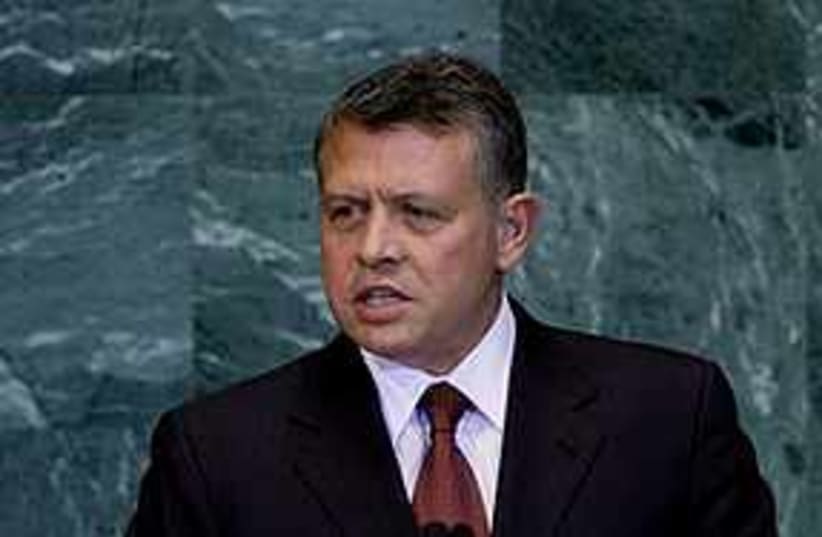The firstborn sonKing Hussein’s firstborn son, Abdullah, was the product of the king’s second marriage, to a Christian Englishwoman named Toni Gardner (renamed Muna upon being married). Abdullah spent much of his childhood and early adult life being educated in England, the United States and later as a British army officer before returning to serve as commander of the Jordanian army’s special forces. From the age of three, however, Abdullah was never placed in line to succeed his father as king.When King Hussein was diagnosed with cancer near the end of the 21st century, he began the process of selecting an heir to the throne. His fourth wife, Queen Noor, lobbied strongly for her son Hamza to be selected; a special committee commissioned by the king chose another of his sons, Ali. However, after failed cancer treatments in the United States, the king returned to Jordan to die in his homeland and unexpectedly named his eldest son Abdullah as crown prince. King Hussein succumbed to his cancer on February 7, 1999 and that day, King Abdullah II ascended to the thrown.A 43rd generation direct descendant of the Prophet Muhammed and the latest in a long line of Hashemite monarchs that once ruled over Jordan, Iraq and Saudi Arabia, King Abdullah II has been a liberalizing and modernizing force in Jordan. He has not however, ruled without controversy. His wife, Queen Rania, is a Kuwaiti-born Palestinian. Due to tensions caused by the country’s unrivaled absorption of Palestinians and the ensuing demographic changes, the Queen’s ethnic heritage has become a point of contention in Jordan. The Hashemite kingdom, which traditionally had a Beduin majority, now has a nearly 80 percent majority of Palestinians, something the Beduin tribespeople have grown to resent.However, King Abdullah II has overseen unprecedented economic and social progress in the last standing Hashemite kingdom. One of, if not Israel’s strongest ally in region, the Jordanian king has played a key role in the Israeli-Palestinian peace process and economic cooperation between Amman and Jerusalem. Although it sits in one of the more unstable corners of an already volatile region, Jordan under Kings Hussein and Abdullah II has become one of the most progressive, forward-looking, adaptive and tolerant countries in the Arab world. From his initiative to provide modern housing for all his country’s citizens, to programs advancing technology-based education, to its place as the only Arab state that ever granted full citizen to Palestinian refugees, its warm relations with Israel and relatively progressive social and civil rights advances, the royal father and son represent a different type of leadership than has existed historically in the Middle East.
This Week in History: Jordan’s surprise kings
Two kings that were peaceful neighbors to Israel, Hussein and Abdullah II, both rose to the throne in less-than-ordinary circumstances.

The firstborn sonKing Hussein’s firstborn son, Abdullah, was the product of the king’s second marriage, to a Christian Englishwoman named Toni Gardner (renamed Muna upon being married). Abdullah spent much of his childhood and early adult life being educated in England, the United States and later as a British army officer before returning to serve as commander of the Jordanian army’s special forces. From the age of three, however, Abdullah was never placed in line to succeed his father as king.When King Hussein was diagnosed with cancer near the end of the 21st century, he began the process of selecting an heir to the throne. His fourth wife, Queen Noor, lobbied strongly for her son Hamza to be selected; a special committee commissioned by the king chose another of his sons, Ali. However, after failed cancer treatments in the United States, the king returned to Jordan to die in his homeland and unexpectedly named his eldest son Abdullah as crown prince. King Hussein succumbed to his cancer on February 7, 1999 and that day, King Abdullah II ascended to the thrown.A 43rd generation direct descendant of the Prophet Muhammed and the latest in a long line of Hashemite monarchs that once ruled over Jordan, Iraq and Saudi Arabia, King Abdullah II has been a liberalizing and modernizing force in Jordan. He has not however, ruled without controversy. His wife, Queen Rania, is a Kuwaiti-born Palestinian. Due to tensions caused by the country’s unrivaled absorption of Palestinians and the ensuing demographic changes, the Queen’s ethnic heritage has become a point of contention in Jordan. The Hashemite kingdom, which traditionally had a Beduin majority, now has a nearly 80 percent majority of Palestinians, something the Beduin tribespeople have grown to resent.However, King Abdullah II has overseen unprecedented economic and social progress in the last standing Hashemite kingdom. One of, if not Israel’s strongest ally in region, the Jordanian king has played a key role in the Israeli-Palestinian peace process and economic cooperation between Amman and Jerusalem. Although it sits in one of the more unstable corners of an already volatile region, Jordan under Kings Hussein and Abdullah II has become one of the most progressive, forward-looking, adaptive and tolerant countries in the Arab world. From his initiative to provide modern housing for all his country’s citizens, to programs advancing technology-based education, to its place as the only Arab state that ever granted full citizen to Palestinian refugees, its warm relations with Israel and relatively progressive social and civil rights advances, the royal father and son represent a different type of leadership than has existed historically in the Middle East.